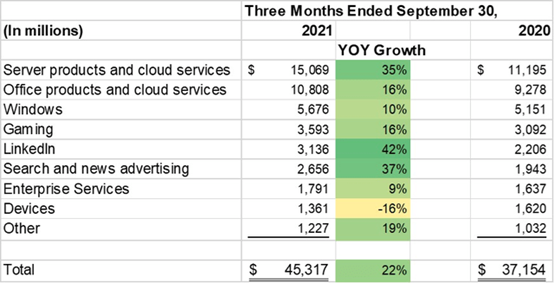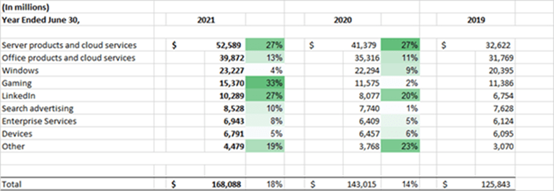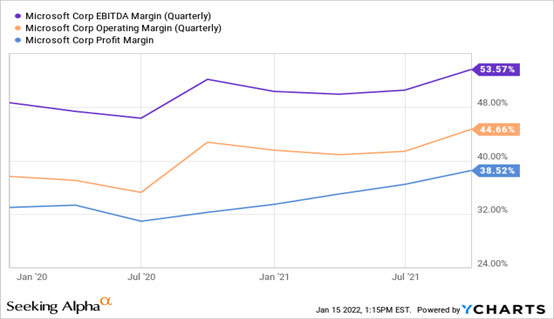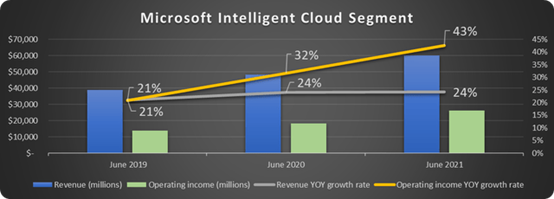Microsoft Corp. will publish fiscal year 2022 second-quarter financial results after the close of the market on Tuesday, Jan. 25.
Consensus EPS is $2.32, slightly ahead of normalized Q1 FY22 actual earnings of $2.27. Q1 FY22 earnings beat estimates by $0.19 per share. Revenue is expected to come in at just over $50 billion in Q2 FY22, ahead of the $45.3 billion posted in Q1 FY22.
Microsoft has beat revenue and EPS estimates for eight straight quarters.
MSFT Stock Key Metrics
There are several metrics that investors will be looking at in the upcoming earnings release.
Segment growth
In examining Q1 FY22 results and full-year fiscal 2021 results, nearly all segments have shown significant growth, except for devices. Server products and cloud services, which encompasses Microsoft Azure and several other items, are the clear growth driver, and investors will want to see continued advancement here.


Profitability
Microsoft's margins have been rising lately, which is terrific news for shareholders. The EBITDA margin above 50% is especially impressive.


Balance sheet
Microsoft continues to show a solid balance sheet position, despite the significant return of capital to shareholders through buybacks and dividends. The company reported over $130 billion on hand in cash and short-term investments compared with $50 billion in long-term debt in the last report. The cash and short-term investment balance account for over 5% of the current market cap. All told, the net debt puts the enterprise value at $2.24 trillion, or about $40 billion less than the market cap. Shareholders can expect a similar capital structure when Q2 FY22 earnings are released.
Nuance acquisition
Microsoft's planned acquisition of Nuance Communications (NUAN) is now under investigation by authorities in the U.K. The acquisition is expected to assist Microsoft in providing industry-specific cloud solutions.
“Nuance provides the AI layer at the healthcare point of delivery and is a pioneer in the real-world application of enterprise AI. AI is technology’s most important priority, and healthcare is its most urgent application. Together, with our partner ecosystem, we will put advanced AI solutions into the hands of professionals everywhere to drive better decision-making and create more meaningful connections, as we accelerate the growth of Microsoft Cloud for Healthcare and Nuance.”- Satya Nadella, CEO, Microsoft
The transaction was expected to close sometime in 2022. According to Microsoft, the all-stock deal will be less than 1% dilutive and should be accretive to earnings in 2023.
Activision Blizzard acquisition
Microsoft used its growing cash pile to buy Activision Blizzard in what appears to be a big bet on the metaverse and the future of immersive VR gaming.
Microsoft Benefits From Massive Gaming Opportunity, Credit Suisse Says: Microsoft's Activision Blizzard deal underscores how content and cloud are kings in gaming and represents a step toward content leadership as well as the addition of incremental scale in cloud streaming, Credit Suisse analyst Winslow said.
"Activision Blizzard represents a significant addition of content and users that we believe positions Microsoft well to execute on a +$200 billion gaming opportunity," the analyst said.
Activision Blizzard can help expand the audience reached by Microsoft for not just paid subscriptions but also in-game transactions, providing the latter with multiple strategic monetization options in both the near- and long-term, Winslow said.
The deal is a strategic and financial positive and can help Microsoft's gaming business across numerous platforms, including mobile, PC, console and cloud, BofA analyst Sills said.
Microsoft's 2023 gaming segment revenue is estimated at $16.9 billion and Activision Blizzard's at $10.3 billion, KeyBanc analyst Turits said.
With this deal, Microsoft becomes the third-largest gaming company globally by revenue behind Tencent Holdings Limited and Sony Group Corporation , the analyst said.
Microsoft is opportunistically acquiring Activision Blizzard at an attractive valuation, Mizuho analyst Moskowitz said.
The acquisition meaningfully enhances the company's mobile gaming presence and presents scope for a stronger position in the Metaverse, the analyst said. He said he expects the company to report good overall fiscal second-quarter results after the close Tuesday.
